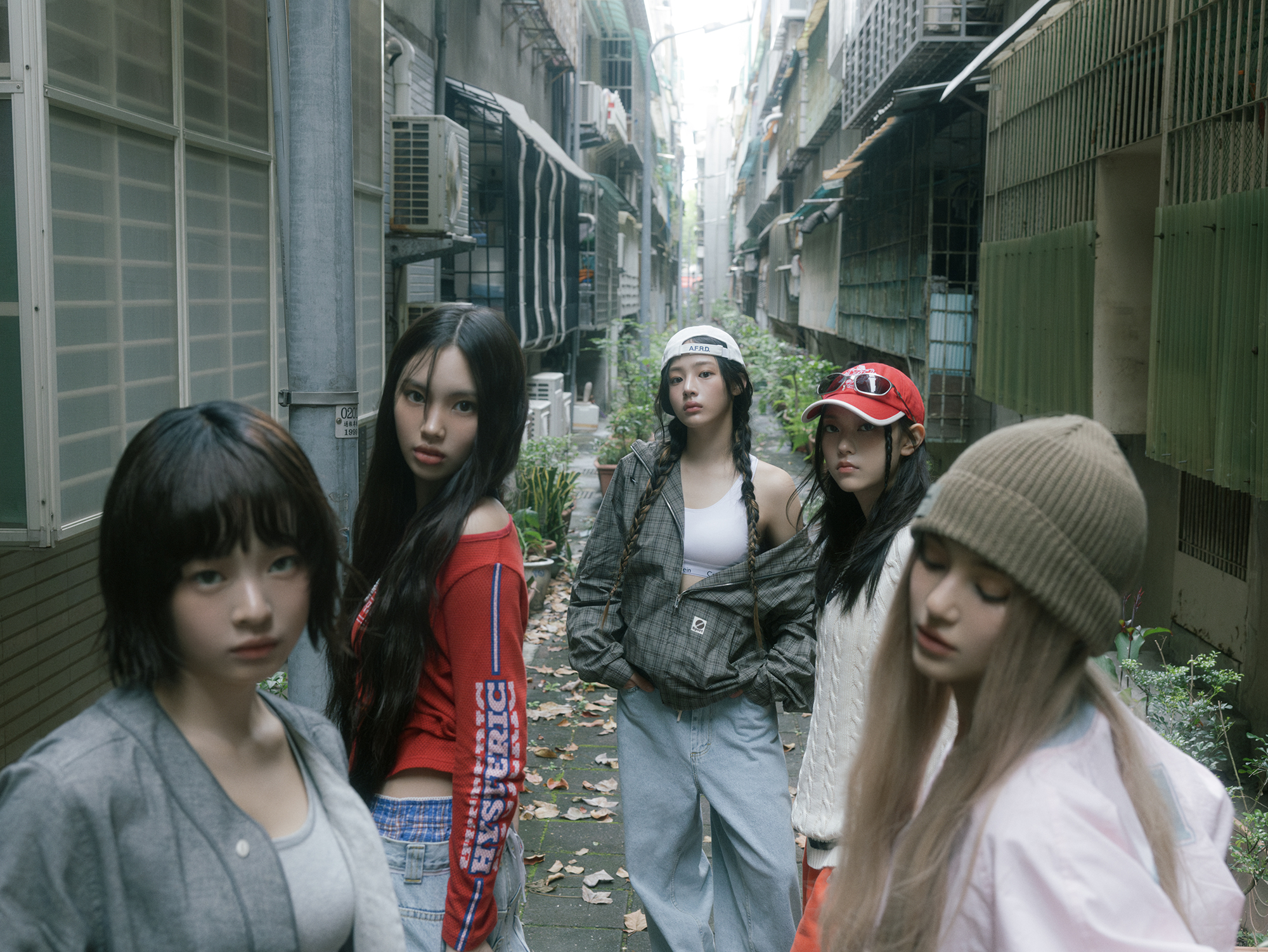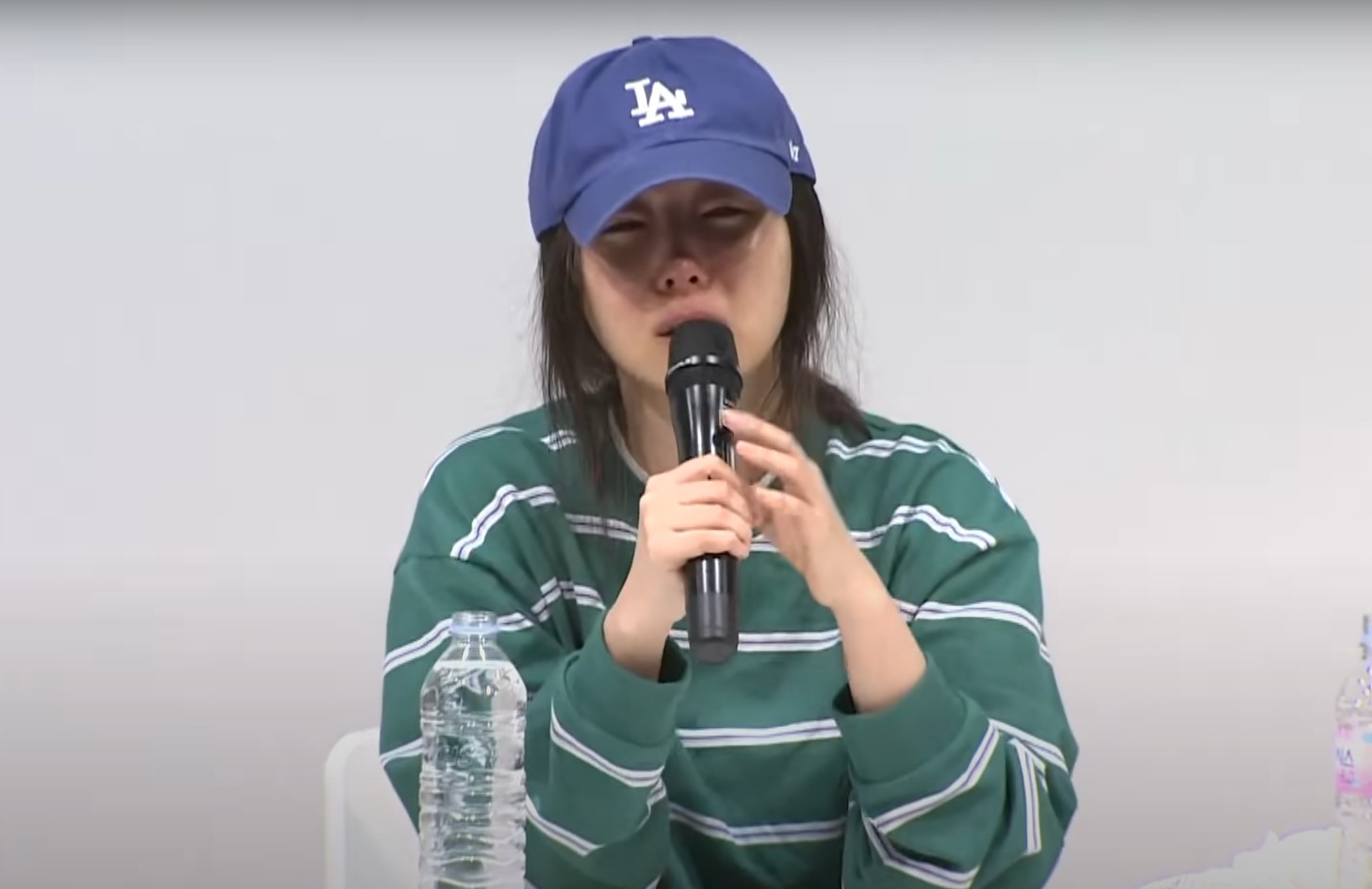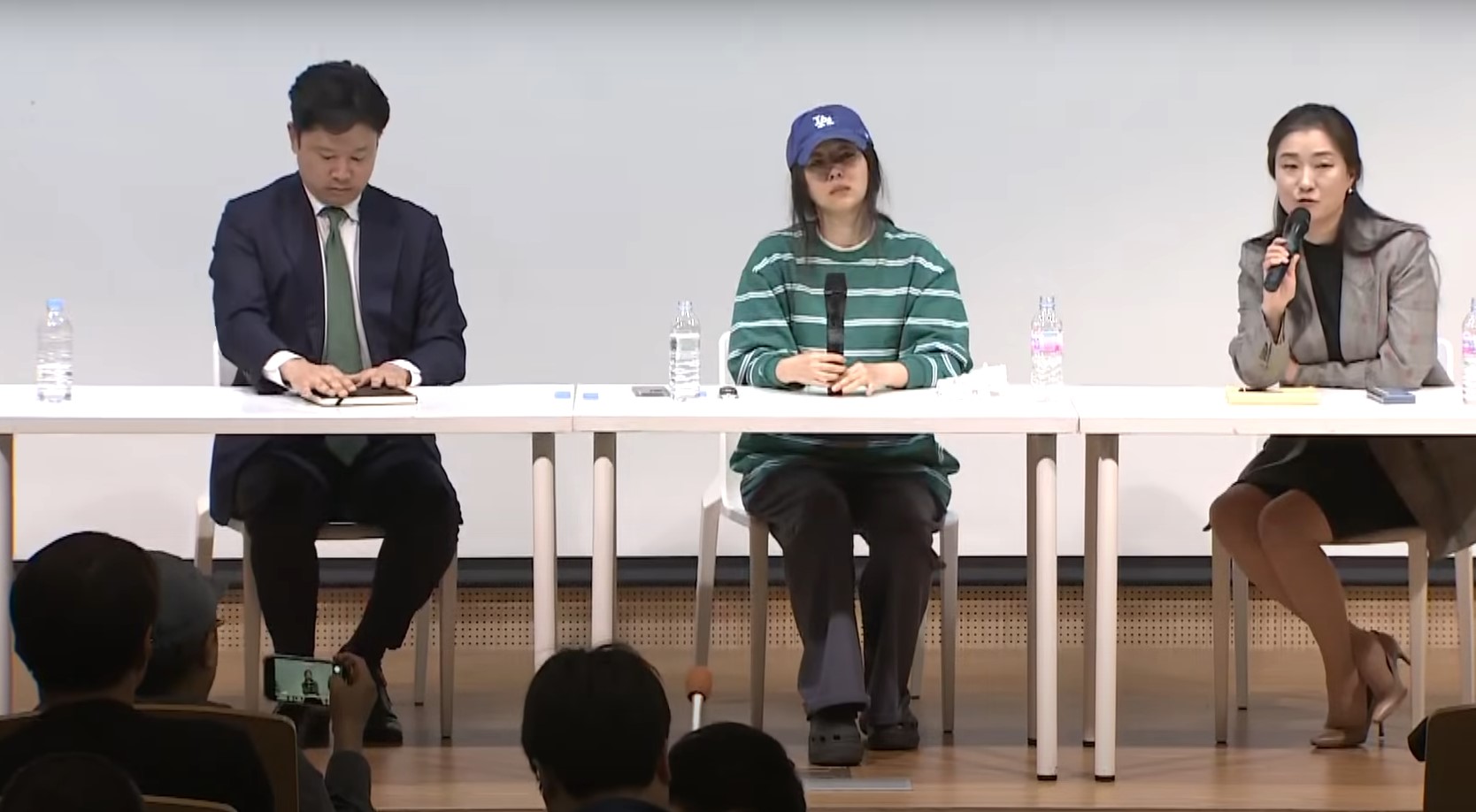The dispute between Min Hee-jin and Hive is being fiercely fought as a public opinion war, with Min Hee-jin using populist tactics to gain public sympathy. She has used emotional monodrama-style press conferences to rally public support, portraying herself as the weak/victim and Hive as the strong/perpetrator.
Populist rhetoric resonates with the social self of the crowd
The dispute between Hive and Min Hee-jin has become increasingly muddled. It’s now even confusing what the initial point of contention was. The two sides first began legal proceedings on May 17, 2024. A hearing was scheduled for the preliminary injunction lawsuit against Hive filed by Heejin Min, the CEO of Adore.
The fight is being fought in a fierce public opinion battle. Younger generations and the nerdy community are supporting Min, while the rest of the site seems to be relatively split. Hive and Min Hee-jin have been making accusations to win over public opinion, and on May 17, they published a series of articles that took each other to task. In particular, Min Hee-jin’s strategy for managing public opinion has been to continue to expand the debate away from the legal issues of embezzlement and management takeover, and to generate negative public opinion against Hive. In the process, the macro topic of K-pop’s sustainable development has been raised, and Hive groups such as Aileet, Le Seraphim, and BTS have been summoned as targets linked to the revelations. Currently, public opinion is dominated by criticism of Hive on major social media and giant communities. Here, we will examine Min Hee-jin’s strategy and stance, and how it resonates with public opinion.

When Hive first publicized the situation with the keyword “management takeover,” Min Hee-jin was on the edge of a precipice. The impact of that press conference was enormous, considering how it turned the tide. It was like everyone was mesmerized. Immediately after the press conference, the internet was buzzing with stories about Min Hee-jin, and on-air reporters were busy calling her “breakthrough”. What Min Hee-jin did was exactly that: incite public opinion (incite is a neutral word here). She addressed the “public” rather than the other side of the dispute, Fang Shih-hyuk, and instead of trying to clarify a given point, she made a new one of her own. In doing so, she expanded the game and took the initiative. People have characterized the interview as candid and impulsive, but it was carefully prepared and controlled.
It worked because he presented a topic that people could understand. The issues in dispute are embezzlement, the flavor of management, and shareholder agreements, but they’re hard to understand without knowing commercial law. Initially, public opinion simplified the situation by criticizing Min Hee-jin as someone who was ungrateful to the company that supported her. It was a kind of false consciousness that relied on the ruling class to take the public’s point of view, in that it was a condemnation of not messing with society’s providence of ‘money and organizational power’.
In this situation, Min Hee-jin broke the game by presenting a folkloric version of the narrative. In the press conference, she talked about the absurdity of the K-pop industry, from the mother-daughter relationship with Newzine, the plight of office workers, the tribulations of women who are mistreated by “Mr. Gazer,” and the fairy tale of the beanpole rat that attracted other label idols with bad publicity. These intuitive topics, which are easily understood by the general public, and the idol fandom’s ability to talk about them like experts, lit a fire under Rizen’s brain. Min, as a woman/mom/worker/artist, occupied a position of vulnerability/victimization that people could identify with, while Hive was accused of being the stronger/perpetrator in the exact opposition of those identities. “Mr. Gazzer” is a powerful exclamation that completes the composition.
The process was staged as a monodrama, a naked expression of his emotions. Crying, laughing, angry, swearing, and crying, the subjects were overwhelmed by an overwhelming flood of emotions that would be unimaginable in a normal press conference. This was actually a performance in a format that people were familiar with. It’s a typical ‘internet broadcast’ emotion. That’s how African BJs broadcast. They cry, get angry, swear, yell, and diss others on camera. The exhilarating emotional energy is consumed as ‘tension’ and ‘dopamine’. For the younger generation, who are used to the internet format of broadcasting, witnessing such a spectacle in a formal setting is a very new, familiar, and therefore strange experience. For the older generation, it would have been seen as an ‘unconventional’ or deviant experience. Min Hee-jin customized her appeal to the dominant codes of her contemporaries, especially the codes of the young internet multiplex.

Storytelling in a good vs. evil narrative
To summarize what Min Hee-jin did, she adapted the narrative of the conflict and rearranged the good and bad characters to tell a vivid story. She presented a simple, classical narrative of good, evil, and moralism, with good and evil taking the place of good and morality. From the press conference to now, every topic Min Hee-jin has raised through the media is aimed at recreating Hive as a public “villain” and appealing to the public to judge the “sins of Hive. Multi-label diversity, criticism of random pokka-like merchandising, and even the issue of album pushing raised on May 17, all public topics that are not directly related to the dispute between the two parties but are morally reprehensible are summoned for him.
Min Hee-jin’s demagoguery is reminiscent of a certain type of politician in power today. It is a typical populist rhetoric to incite hostility towards the elite while claiming to represent the underclass, the “ordinary people. They capitalize on social conflicts, stir up people’s anger, and present them with targets to defuse it. In this process, nationalism was also brought into the mix, adding another strand to the conflict: a performance in which the Japanese idol Sakura Miyawaki was named as the “other” who had stolen Newzine’s share of the market. She complained that Korean women were discriminated against because of Japanese women. Many of the “pro-Japanese” conspiracy theories about LeSeraphim and Hive that are currently circulating on YouTube and in the subreddits are derived from this anti-Japanese code.
What is really dangerous is that this process is carried out as a punishment for irresponsible actors. Newzine, Eilit, and Reseraphim were called out by Min Hee-jin, and they were included in both good and bad roles as “my babies” of Min and Bang. Aileet’s copycatting of Newzine, and the anecdote of Newzine’s debut being pushed back before LeSeraphim’s, is a central event in this K-pop “beanstalk” fairy tale, and one that Min strategically exposed to establish the narrative. The Encore and Coachella controversies reignited the animosity toward LeSeraphim, and Aileet was dragged into the fray, labeled a “fake news story,” and dragged through the mud.
Public opinion was largely turned upside down by the sadism and vindictiveness of the crowd immersed in the lynching. After the press conference, the abuse against Aileet and LeSeraphim exploded on the community, YouTube, and all social media. LeSeraphim and Eilidh were just following the company’s contract. They were villains not because they did anything evil, but because they were on the opposite side of the monologue from the good guys in that press conference. The amount of vitriol directed at them has really crossed a dangerous threshold. Not only their group account, but also their individual Instagram accounts have been taken over by vitriol, and blatant vitriol is getting upvotes. Public opinion has even reached the accounts of other celebrities who have collaborated with them, citing news reports, making sarcastic comments, and calling for ‘stop losses’. Min Hee-jin is constantly referring to these two groups, and her current dominance in the entertainment community and on social media is largely due to the hostile public opinion towards these two groups. This is a very morally distorted and dangerous way of mobilizing public opinion.

Errors in perception caused by the narrativization of reality
The ‘narratization of reality’ is an easy way for the people to understand and immerse themselves in reality. However, it is also a trap that distorts perceptions by fitting reality into a narrative plot. Facts that don’t fit the good vs. evil narrative of Min Hee-Jin vs. Hive are dismissed, and facts that do are adopted and exaggerated. This framing does not allow for an accurate understanding of the much-touted “reality of the K-pop industry,” and therefore all discussions and conclusions are inaccurate. The absurdities that Hive is accused of committing are not reflected on the K-pop industry as a whole, but are instead objectified as the fault of Hive alone. This is the result of a public agenda being appropriated as a tool for public opinion warfare.
Min Hee-jin has gained a lot of support for her feminist stance. His situation is being used as a lens to criticize male-centered society. This is due to the image and framing of Min Hee-jin as a “persecuted female office worker in a geezer society” that she has positioned herself. In the entertainment industry, as in other fields, there seems to be a consensus that defending “successful women,” which are scarce, from the onslaught of male executives is itself feminist. “Before you point fingers at her for being different,” published in Hankyoreh 21, is exactly that. The article evaluates the situation from a feminist perspective, but it does not look at Min Hee-jin’s previous actions and values, and instead schematically places individual women in the universalized position of a male group. In fact, even in that press conference, Min Hee-jin revealed her perspective of serving the “masculine universal.
She judged the age of the female trainees, evaluated the appearance of the members of Newzine, and reiterated patriarchal conventions that equate women with motherhood. The image of an older woman, an adult in the industry, naming the members of Ailee and Reseraphim and the younger women who are just making their debut in the industry in a pie chart is far from the kind of solidarity among women that feminism seeks, even at its best. Min Hee-jin’s behavior as an organizer is also far from feminist. For example, when Newzine’s “OMG” MV was released, there was controversy that it portrayed gender-based criticism of the group as the work of mentally ill abusers. It’s also hard to ignore the story that broke on May 17, when a sexual harassment complaint was filed against the vice president of ADORE, who asked the group to treat female employees in a domineering manner. I have the impression that Min Hee-jin is not representing feminism, but mobilizing feminism as a means of public opinion warfare.
The positive attitude towards Min Hee-jin seems to be particularly strong in the liberal media, and it’s understandable why they are attracted to her. She won the confrontation with the elite with a grassroots frame and reversed the media play of mobilizing the institutional media with a single press conference. On YouTube and in the community, he has gained the favor of grassroots public opinion. There’s a lot of narrative here that the liberal media might find appealing. But that desire should not be a substitute for objective assessment and reflection on the situation. Min Hee-jin’s press conference is not inappropriate simply because it lacks the formality of public speech. It was a mixture of so much that was morally and politically incorrect, and the sentiment triggered by the incorrectness was a key mechanism of public fascination. The spectacle, catharsis, and value transfer are not far removed from the sentiments underlying the phenomenon we call social “far-rightization.
My injustice becomes the absolute justification for my rationalization, and “my babies and other people’s babies” becomes the framing that gives moral legitimacy to my survivalism. The belief that it doesn’t matter what you do to someone who deserves it is also practiced. Survivalism and retribution, instrumentalized ideologies for confrontation, crowd violence… these are reproduced behind the press conference frenzy, resonating strongly with people’s social egos. There have been many commentaries analyzing the “Min Hee-jin phenomenon,” but I haven’t seen any that ask this question. While this may be evidence that the media and diners ultimately viewed the incident as a form of “celebrity gossip” and downplayed its harm, we shouldn’t overlook the fact that it hides the code of our society.